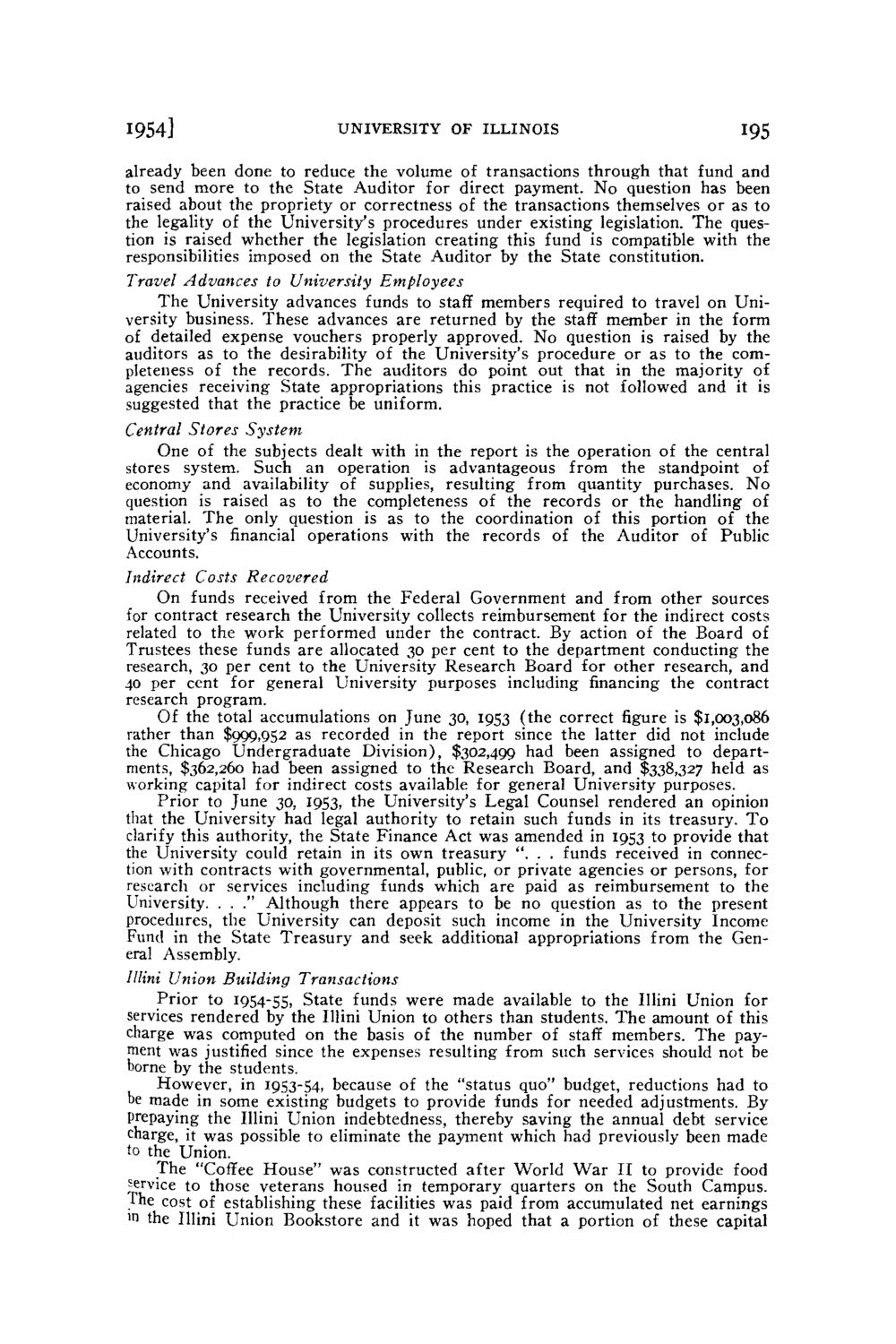| |
| |
Caption: Board of Trustees Minutes - 1956
This is a reduced-resolution page image for fast online browsing.

EXTRACTED TEXT FROM PAGE:
1954] UNIVERSITY OF ILLINOIS 195 already been done to reduce the volume of transactions through that fund and to send more to the State Auditor for direct payment. No question has been raised about the propriety or correctness of the transactions themselves or as to the legality of the University's procedures under existing legislation. The question is raised whether the legislation creating this fund is compatible with the responsibilities imposed on the State Auditor by the State constitution. Travel Advances to University Employees The University advances funds to staff members required to travel on University business. These advances are returned by the staff member in the form of detailed expense vouchers properly approved. No question is raised by the auditors as to the desirability of the University's procedure or as to the completeness of the records. The auditors do point out that in the majority of agencies receiving State appropriations this practice is not followed and it is suggested that the practice be uniform. Central Stores System One of the subjects dealt with in the report is the operation of the central stores system. Such an operation is advantageous from the standpoint of economy and availability of supplies, resulting from quantity purchases. N o question is raised as to the completeness of the records or the handling of material. The only question is as to the coordination of this portion of the University's financial operations with the records of the Auditor of Public Accounts. Indirect Costs Recovered On funds received from the Federal Government and from other sources for contract research the University collects reimbursement for the indirect costs related to the work performed under the contract. By action of the Board of Trustees these funds are allocated 30 per cent to the department conducting the research, 30 per cent to the University Research Board for other research, and 40 per cent for general University purposes including financing the contract research program. Of the total accumulations on June 30, 1953 (the correct figure is $1,003,086 rather than $909,952 as recorded in the report since the latter did not include the Chicago Undergraduate Division), $302,499 had been assigned to departments, $362,260 had been assigned to the Research Board, and $338,327 held as working capital for indirect costs available for general University purposes. Prior to June 30, 1953, the University's Legal Counsel rendered an opinion that the University had legal authority to retain such funds in its treasury. T o clarify this authority, the State Finance Act was amended in 1953 to provide that the University could retain in its own treasury ". . . funds received in connection with contracts with governmental, public, or private agencies or persons, for research or services including funds which are paid as reimbursement to the University. . . ." Although there appears to be no question as to the present procedures, the University can deposit such income in the University Income Fund in the State Treasury and seek additional appropriations from the General Assembly. Illini Union Building Transactions Prior to 1954-55. State funds were made available to the Illini Union for services rendered by the Illini Union to others than students. The amount of this charge was computed on the basis of the number of staff members. The payment was justified since the expenses resulting from such services should not be borne by the students. However, in 1953-54, because of the "status quo" budget, reductions had to be made in some existing budgets to provide funds for needed adjustments. By prepaying the Illini Union indebtedness, thereby saving the annual debt service charge, it was possible to eliminate the payment which had previously been made to the Union. The "Coffee H o u s e " was constructed after World W a r I I to provide food Jervice to those veterans housed in temporary quarters on the South Campus. The cost of establishing these facilities was paid from accumulated net earnings "i the Illini Union Bookstore and it was hoped that a portion of these capital
| |